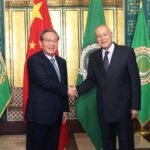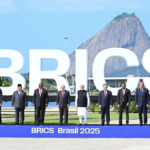For its major trading partners, U.S. enthusiasm for tariffs is nothing new. The latest evidence suggests that the U.S. administration will impose a 10 percent "minimum baseline tariff," and even higher rates on certain trading partners.
To some extent, Washington's flagrant bullying practice indicates the U.S. administration's growing jitters and anxiety concerning the retention of its position of superiority in an increasingly globalized world. However, it's ridiculous that the United States opts for protectionism instead of embracing the trend of the times. Playing the "tariff card" is a lose-lose game that also hurts the United States itself.
If the U.S. administration does follow through with its tariff plans, it would further elevate what are already the nation's highest tariff levels over the past decades. Leading U.S. economists have warned of high implementation costs and collectively voiced concerns about grave consequences -- such as higher consumer prices, increased inflation, a rise in unemployment, and even an economic recession.
According to a Yale University study, reciprocal tariffs will incur the United States a price level rise of 2.1 percent, should other countries choose to retaliate. This is equivalent to a loss of 2,700 to 3,400 U.S. dollars per household on average. Meanwhile, overall U.S. economic growth will drop by 1 percentage point in 2025.
Notably, classical Western economics underlines the benefits of free trade and the division of labor. America should know it can never return to the primary ends of the global supply chain in all sectors. What the U.S. administration is doing goes against basic economic laws.
It is not possible for the United States to deny that it has benefited a lot from free trade and a multilateral trading system. After all, this system substantially lowered living costs and raised living standards for people in the United States over the past decades.
Tariffs will cause damage across the board. Retaliation is almost certain and likely to be considerable. By announcing the so-called "reciprocal tariffs" scheme, the U.S. administration is dealing a heavy blow to the world trading system and the global economy at large.
For example, the Organization for Economic Cooperation and Development (OECD), in its latest Economic Outlook, forecast that global GDP growth is projected to moderate to 3.1 percent in 2025 and 3 percent in 2026. The OECD is also warning that higher and broader trade barriers will negatively impact growth around the world and add to inflation.
Any attempt to curb trade flows in the global village will backfire. Unchecked protectionism has the very real potential to trigger trade wars, with catastrophic consequences for all parties concerned, while also destabilizing the global economy. A stable and predictable trading environment should not be a luxury. It is a necessity for healthy global economic growth. Equal dialogue is the only viable approach to resolving trade disputes while bullying tariffs make things worse.
Building a better world requires shelving the obsession with tariffs and pursuing shared development based on openness and cooperation.









